
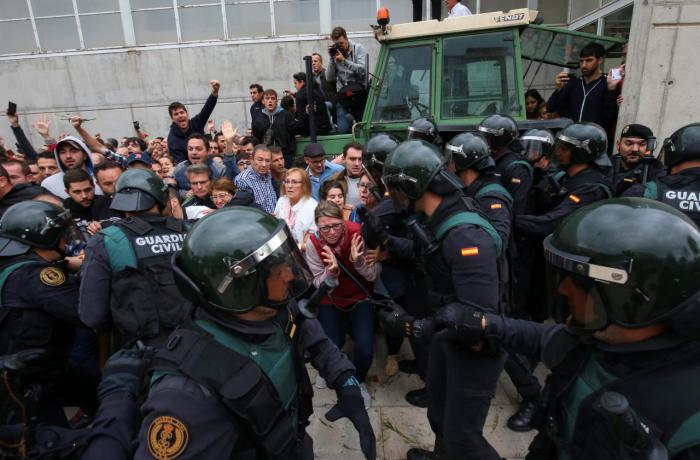
As anti-statists and internationalists, anarchists often have mixed feelings about movements calling for new nation states, even small ones.
But there are times when an instinctive hatred of centralised authority, and the violence with which it is imposed, completely overwhelms such ideological qualms.
Such is the case with events currently unfolding in Catalonia, where the “unauthorised” referendum staged on October 1 has been met with alarming levels of repression by the central Spanish state.
Before the event hundreds of websites were shut down, officials arrested, printing presses raided, ballot papers confiscated and media threatened.
On the day, people who turned out to vote were physically attacked by Spanish riot cops, leaving 900 injured. Videos circulating on social media showed one cop jumping from a staircase to stamp on a voter beneath, another deliberately breaking someone’s fingers one by one, others brutally bludgeoning people sitting passively in a road. Rubber bullets were fired at unarmed and largely passive crowds.
Anarchists have long known that violence is the foundation of the state and of all authority. Sometimes it remains hidden beneath the surface, but it is always there.
Declaring land “private property” and excluding people from their collective birthright is violent. Making people work for others’ profit, or else face starvation, is violent. The very idea of a police “force” is violent. A legal system which claims the right to chastise and imprison is violent.
The bottom line is that everyone knows that any attempt to defy the power of authority, no matter how peacefully, will be met with violence. Normally this remains unsaid, a kind of social subtext. But there are moments when the reality emerges in all its ugliness.
This is what is happening in Catalonia right now. Authority, with a capital A, is imposing itself against the people. You can put aside all the details of the Catalan situation, it really is as simple as that.
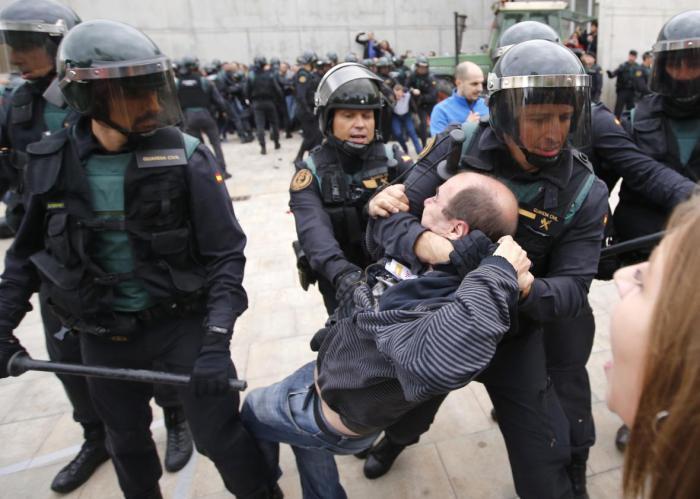
And for those who remain convinced that the European Union in some way represents a force for good, its complete lack of condemnation for the Spanish state should act as a wake-up call.
The EU is just a centralised version of the same violent mafia that have been running all the various nation-states of Europe for hundreds of years. It is not condemning the Spanish state because all the states that it represents reserve the right to behave in exactly the same, violent, way, wherever their authority is challenged.
To his credit, Craig Murray, a radical commentator who was once UK ambassador to Uzbekistan, has admitted on his blog that events in Catalonia had proven him mistaken in his long-time support for the EU.
He writes: “The EU reacted as if no such abuse had ever happened at all, and the world had not seen it. The institution has in fact been overrun by the right wing cronyism of the neo-liberal political class, and no longer serves the principles for which it ostensibly stands. It is become simply an instrument of elite power against the people”.
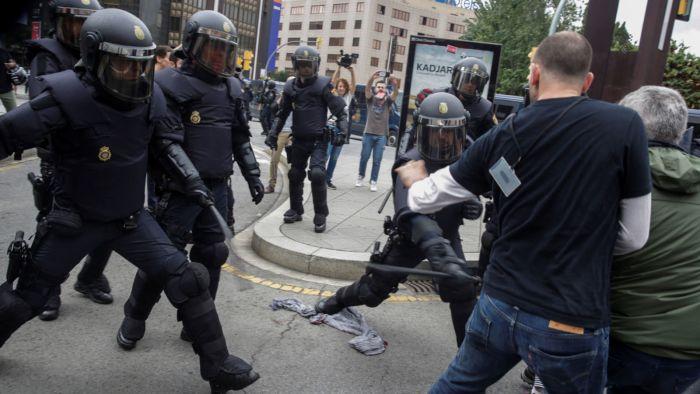
In Spain there is even some fascistic continuity. The ruling right-wing People’s Party began life in 1976 as the People’s Alliance, founded by Manuel Fraga, a former minister under dictator General Franco.
The Francoist spirit lingering in the Spanish riot police, and the nazi-saluting Spanish right-wing nationalists who support their thuggery, is plain to see.
And there are clear echoes of Catalan resistance to the central Francoist state in the grass-roots Catalan independence movement.
While corporate media coverage aims to dilute support for Catalonia by pointing to the fact that the region is wealthy, and there are right-wing as well as left-wing independence parties, the current repression has pushed the Catalan struggle well into left-wing libertarian territory.
In an informative interview with Jacobin Magazine, Lluc Salellas of the Catalan anti-capitalist party Candidatura d’Unitat Popular (CUP) pointed out that the clamp-down on Catalan autonomy has a social as well as a centralist dimension.
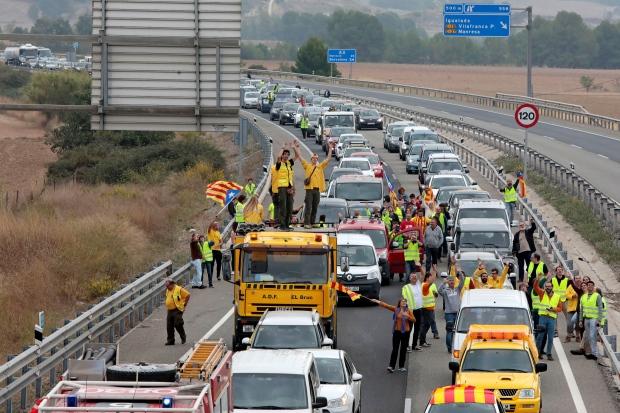
“We want to use our autonomy to improve people’s lives and we are forbidden. People see this and respond. They want to decide the future of Catalonia and that is not possible in the current arrangement.
“The movement has already moved to the Left — the laws I mentioned earlier were a sign of that, they were social measures supported even by the center-right. The streets have an idea of something new in Catalonia, something bottom-up.”
Salellas was speaking on October 3, the day of a general strike called in response to Spanish central repression. It was a strike in which anarchist unions took a leading role.
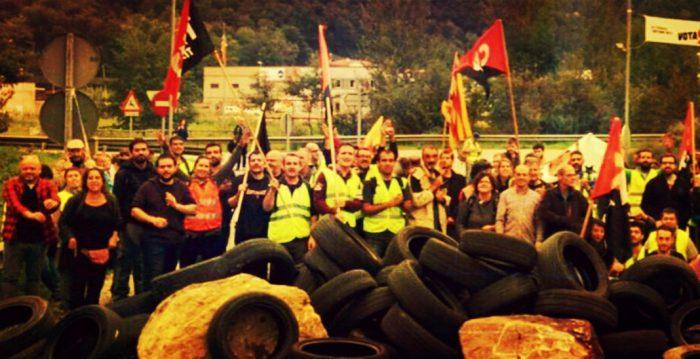
“There was a very widespread stoppage: almost everything closed from small shops to public institutions and transport. In total, more than fifty roads were blocked, which has significantly disrupted the transport of goods. It wasn’t just in Barcelona, either. In Girona, one of the regional capitals, there was a demonstration of 50,000. The city’s population is only 100,000, so it will be the biggest protest in the city’s history.”
And he placed the repression used by the Spanish state in a wider context. He said the Catalans’ battle was an important moment for Europe. “If we don’t win it, the idea that governments can meet democratic expressions with violence will spread. This weekend it was Catalonia, but it won’t end here. We could see it normalized across Europe.”
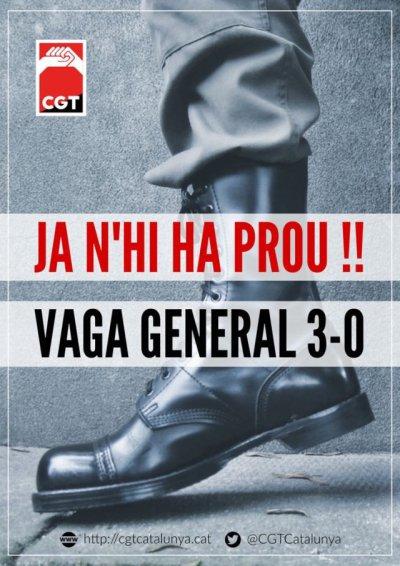
If the authorities can get away with it in Barcelona and Catalonia, with their proud revolutionary spirit and sense of community, they might conclude they could get away with it anywhere.
In this context, the days and weeks ahead in Catalonia may well prove decisive for all of us. Solidarity is badly needed, rather than ideological hand-wringing about the dangers of expressing solidarity even with left-wing forms of nationalism (when was that ever a problem regarding Kurdistan, for instance?).
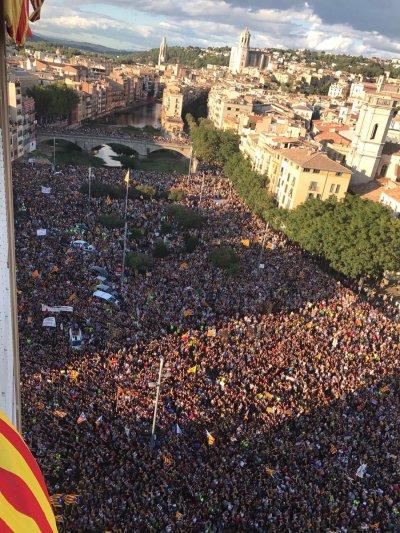
The massive crowds on the streets of Barcelona, Girona and elsewhere, along with the brutal and panicky state reaction, are increasingly conjuring up memories of the Arab Spring of 2011.
Who knows where this will lead? The Spanish state, via its courts, has already suspended the session of the Catalan Parliament at which it was expected to declare independence in the wake of the”yes” vote.
Salellas suggests: “The Spanish state will probably try to use Article 155 of the constitution to definitively end our autonomy. They may also arrest the Catalan president, as well as other political figures.
“If this happens, the streets will rise up and we will have a major confrontation. The independence movement has a lot of people — I estimate up to a million — ready to be very active in this campaign over a long period of time. It won’t be easy for the Spanish state to repress a movement of that size.”
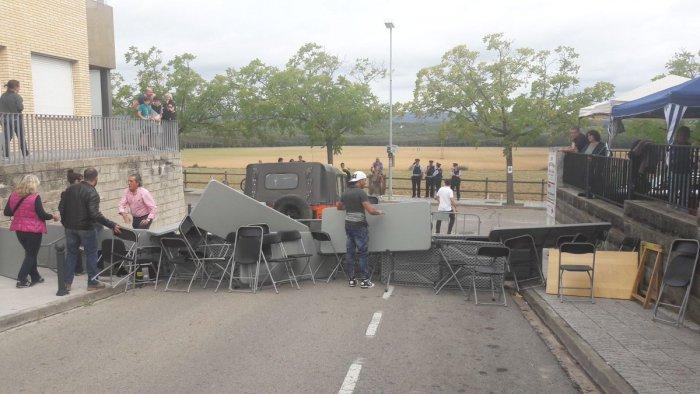
The Acorn